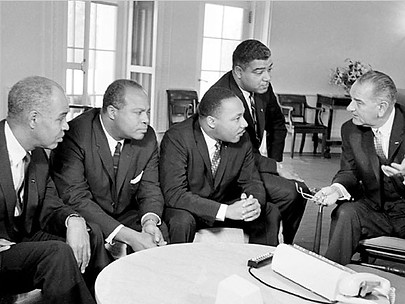Whitney M. Young
Society Reception


Founded on December 12, 2013, under Urban League President & CEO Michael P. McMillan, the Whitney M. Young Society honors outstanding donors-those giving $500 to over $5,000 in unrestricted revenue for Urban League programs and services. e society generated over $300,000 towards the League’s services.
McMillan named the society in honor of great Civil Rights Icon and former National Urban League President/CEO Whitney M. Young, who served the Urban League from 1961-1971.
Born and raised in Kentucky, Young’s experience of racism while serving in an anti-aircra company with African American soldiers and white o cers during WWII increased his interest in civil rights. Under Young’s leadership at the National Urban League, the agency grew from 60 to 98 chapters.





Whitney Moore Young Jr. (July 31, 1921 – March 11, 1971) was an American civil rights leader. He spent most of his career working to end employment discrimination in the United States and turning the National Urban League from a relatively passive civil rightsorganization into one that aggressively worked for equitable access to socioeconomic opportunity for the historically disenfranchised.
In 1961, at age 40, Young became Executive Director of the National Urban League. He was unanimously selected by the National Urban League's Board of Directors, succeeding Lester Granger on October 1, 1961. Within four years he expanded the organization from 38 employees to 1,600 employees; and from an annual budget of $325,000 to one of $6,100,000. Young served as President of the Urban League until his death in 1971.
Whitney M. Young
The Urban League had traditionally been a cautious and moderate organization with many white members. During Young's ten-year tenure at the League, he brought the organization to the forefront of the American Civil Rights Movement. He both greatly expanded its mission and kept the support of influential white business and political leaders. In an 1964 interview with Robert Penn Warren for the book Who Speaks for the Negro?, Young expressed the mission of the Urban League not as ground-level activism in itself but as the supplement and complement of the activities of all other organizations; he states, "we are the social engineers, we are the strategists, we are the planners, we are the people who work at the level of policy-making, policy implementation, the highest echelons of the corporate community, the highest echelons of the governmental community – both at the federal, state and local level – the highest echelons of the labor movement."
As part of the League's new mission, Young initiated programs like "Street Academy", an alternative education system to prepare high school dropouts for college, and "New Thrust", an effort to help local black leaders identify and solve community problems.
Young also pushed for federal aid to cities, proposing a domestic "Marshall Plan". This plan, which called for $145 billion in spending over 10 years, was partially incorporated into President Lyndon B. Johnson's War on Poverty. Young described his proposals for integration, social programs, and affirmative action in his two books, To Be Equal (1964) and Beyond Racism (1969).
As executive director of the League, Young pushed major corporations to hire more blacks. In doing so, he fostered close relationships with CEOs such as Henry Ford II, leading some blacks to charge that Young had sold out to the white establishment. Young denied these charges and stressed the importance of working within the system to effect change. Still, Young was not afraid to take a bold stand in favor of civil rights. For instance, in 1963, Young was one of the organizers of the March on Washington despite the opposition of many white business leaders.

Despite his reluctance to enter politics himself, Young was an important advisor to Presidents Kennedy, Johnson, and Nixon. In 1968, representatives of President-elect Richard Nixon tried to interest Young in a Cabinet post, but Young refused, believing that he could accomplish more through the Urban League.
Young had a particularly close relationship with President Johnson, and in 1969, Johnson honored Young with the highest civilian award, the Presidential Medal of Freedom. Young, in turn, was impressed by Johnson's commitment to civil rights.
Despite their close personal relationship, Young was frustrated by Johnson's attempts to use him to balance Martin Luther King's opposition to the increasingly unpopular Vietnam War. Young publicly supported Johnson's war policy, but came to oppose the war after the end of Johnson's presidency.
In 1968, Herman B. Ferguson and Arthur Harris were convicted of conspiring to murder Young as part of what was described as a "black revolutionary plot." The trial took place in the New York State Supreme Court, with Justice Paul Balsam presiding
The Whitney M. Young Society membership levels:
- Legacy $5,000+
- Heritage $2,500+
- Founder $1,000+
- Pillar $500+
